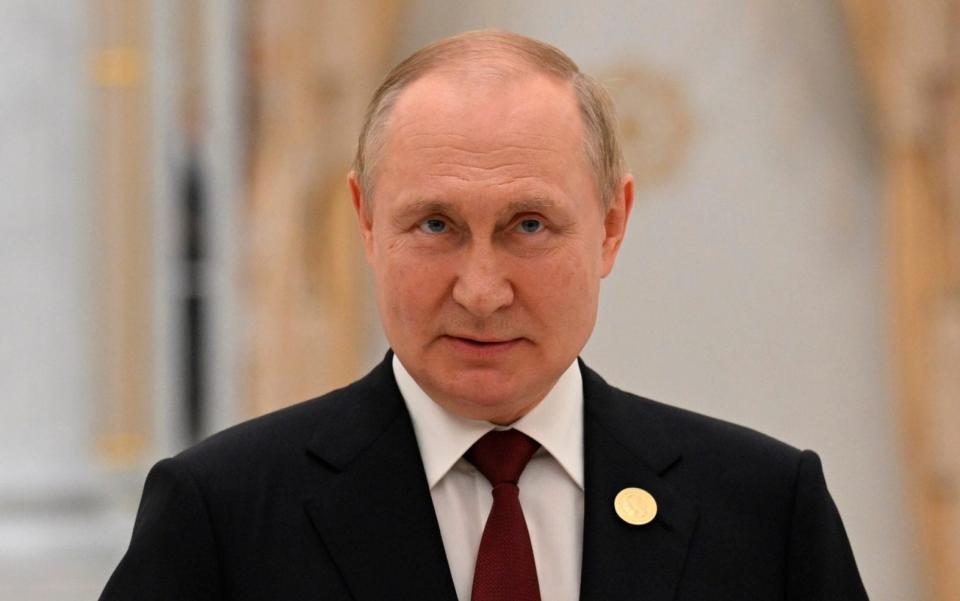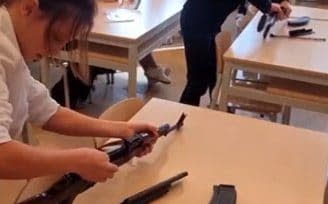Putin’s ‘patriotic education’ sabotaged by parents and teachers

When Maria, an English teacher at a prestigious private school outside Moscow, first heard that the Education Ministry was introducing a new weekly class to promote the Kremlin’s world view, she was “appalled”.
The “Talking about What’s Important” sessions were initially intended to extol the virtues of Russia’s invasion of Ukraine among other things when they were launched last year. However, they have since been watered down to revolve around more innocuous subjects such as Russia’s greatest scientists or national holidays, according to lesson plans seen by The Telegraph.
Only one of them looks decidedly political: the anniversary of the Crimean annexation - and Maria (not her real name) was having none of it.
She told The Telegraph that she has turned the lessons into discussions about philosophical issues instead. For the compulsory class about Crimea, she plans to talk about the history of the Black Sea peninsula with no mention of the illegal Russian annexation in 2014.
“I have not held a single lesson about the ‘war heroes’ because I don’t think they’re heroes. It’s not our job to promote anything,” she said.
“Right now, there is room for sabotage.”
Since the start of its invasion of Ukraine last year, the Kremlin has been using schools to ramp up efforts to indoctrinate the next generation of Russian children and dispel any doubts about the goals and wisdom of the war - still officially called a “special operation”.
Vladimir Putin has personally pushed for a “common standard” in school history textbooks, which are set to include a new chapter on the conflict from September, and stressed the need for “patriotic education”.

Many of the 1 million Russians who fled the country in the aftermath of the invasion cited fears that staying put would mean exposing their children to brainwashing not unlike that seen in the Soviet Union.
But the results have so far been mixed.
Many parents and children in Moscow who The Telegraph spoke to said the Kremlin-prescribed one-hour class is a farce that can easily be ignored without retribution.
Olga, a university lecturer with a teenage daughter at school in the capital, said the principal did not mind when she asked for her daughter to be exempt from the weekly session.
She said older kids were “just making fun of it all”.
In another Moscow school, a Kremlin-imposed weekly “patriotic” ceremony involving singing the national anthem and raising the Russian flag had to be scrapped after some students rebelled.
“Kids don’t want to be standing still and singing the anthem at 8.30am, “ said Katya, a history teacher at the institution, who declined to give her real name. “It has become a drudgery. Kids are rejecting it.”
She is rebelling too. A recent lesson plan passed down by the Kremlin on family values included a video package featuring Ivan Okhlobystin, a notorious anti-gay, war-mongering entertainer who has urged Russian troops to “kill everyone” in Ukraine.
Katya didn’t play it to her students - and said she felt confident that there would not be any consequences.
📹 Russian media published a video allegedly from a school in temporarily occupied Crimea, where children are taught to assemble a machine gun, wear camouflage uniforms and conduct hand-to-hand combat. #StopRussianAggression
Source: RIA Novosti pic.twitter.com/Qr1tHz0WUJ— UkraineWorld (@ukraine_world) March 15, 2023
In rural areas away from the opposition-minded big cities, however, the situation is different.
Many school principals are eager to earn praise and, potentially, more funding and subsidies from the regional government. People in Russia’s poorer areas are also more likely to genuinely support the army because mobilisation - and the subsequent army casualties - have affected them more.
As a result, many schools and even nurseries have taken to the press or social media to proudly show off their children partaking in nationalist activities in support of the war.
In the impoverished central town of Sudogda, population 10,000, students at St Catherine Orthodox school have been making candles for Russian soldiers to use in the trenches in Ukraine.
“The kids enjoy making gifts for them because they’re proud of our army,” Svetlana Shevyrina, an arts and crafts teacher at the school, told a local TV station last month.
She praised the children for “leaning in to support the troops since the very start of the special military operation.”
In Russian-occupied Crimea, the RIA Novosti news agency last week put out a video showing young teenagers defly taking apart what appears to be an AK-47 automatic rifle, with other students looking on.

And in the southern city of Stavropol, a man fresh from the front line was invited to speak at a local school earlier this month. Wearing camouflage, a video posted online showed the man telling students about looting Ukrainian homes and eating their food.
The impact for now may be minor - but it will accumulate in the long term, said Ekaterina Schulmann, a prominent political scientist.
“Certainly this is potentially very harmful,” she said, adding that the degree of damage depends on how long Putin’s regime will last.
“If it lasts for ten years, you can corrupt an entire generation, and apparently they’re counting on that.”
Yet even in rural Russia, there are still some teachers finding ways to push back against the Kremlin’s initiatives.
Oleg, a football teacher from a small town in central Russia, was recently invited by a coach from a neighbouring town to visit for a tournament titled “We Don’t Give Up Our Guys”, a well-known Russian propaganda slogan.
The coach suggested Oleg’s team bring donations of candles and underwear that could be sent to the front line.
Oleg refused: “I said: ‘Why are you dragging kids into politics?’ We didn’t go to that tournament.”

 Yahoo News
Yahoo News 